The Role of Supplements in Your Dog’s Nutrition is something we should all understand better. Dogs need good food and sometimes even a little extra help to stay healthy. In this article, we’ll explore what our furry friends really need, the key nutrients that keep them thriving, and how supplements can fill in the gaps. We’ll chat about the types of supplements available and how to pick the best ones for our dogs while debunking common myths. Let’s dive in and learn how to help our four-legged pals live their best lives!
Key Points to Remember
- Supplements can help our dogs stay healthy.
- They fill in any gaps in our dog’s diet.
- Some supplements support joints and bones.
- We should talk to a vet before giving supplements.
- Too many can be harmful, so we use them wisely.

Understanding Dog Nutrition Basics
What Do Dogs Need to Stay Healthy?
When we think about our furry friends, their health is always top of mind. Just like us, dogs need a balanced diet to thrive. So, what do they really need?
First off, water is essential. Dogs should always have access to fresh water. Then, there’s food. A well-rounded diet includes proteins, fats, carbohydrates, vitamins, and minerals. Each of these plays a role in keeping our dogs happy and healthy. For more information on dog food options, check out the discussion on wet food vs. dry food.
Key Nutrients for Our Dogs
Let’s break it down a bit more. Here’s a quick look at the key nutrients our dogs need:
| Nutrient | Importance |
|---|---|
| Proteins | Build and repair tissues, support growth |
| Fats | Provide energy, support cell function |
| Carbohydrates | Source of energy, aids digestion |
| Vitamins | Support immune function, promote healthy skin |
| Minerals | Important for bones, teeth, and overall health |
Essential Nutrients for Dogs
Now, let’s dive deeper into those essential nutrients.
- Proteins: These are the building blocks of our dogs’ bodies. They help in muscle growth and repair. Good sources include chicken, beef, and fish.
- Fats: Healthy fats are crucial for energy and help keep our dog’s coat shiny. Look for omega-3 and omega-6 fatty acids found in fish oil or flaxseed. For tips on maintaining a shiny coat, visit keeping your dog’s coat healthy.
- Carbohydrates: While dogs don’t need carbs as much as we do, they can still benefit from them. Foods like sweet potatoes and brown rice provide energy and fiber.
- Vitamins: Vitamins A, D, E, and K are vital for various body functions. A mix of fruits and veggies can help provide these nutrients.
- Minerals: Calcium and phosphorus are key for strong bones. Meat and dairy products can help meet these needs.
In our journey of understanding dog nutrition, it’s clear that a balanced diet is the foundation of their health.
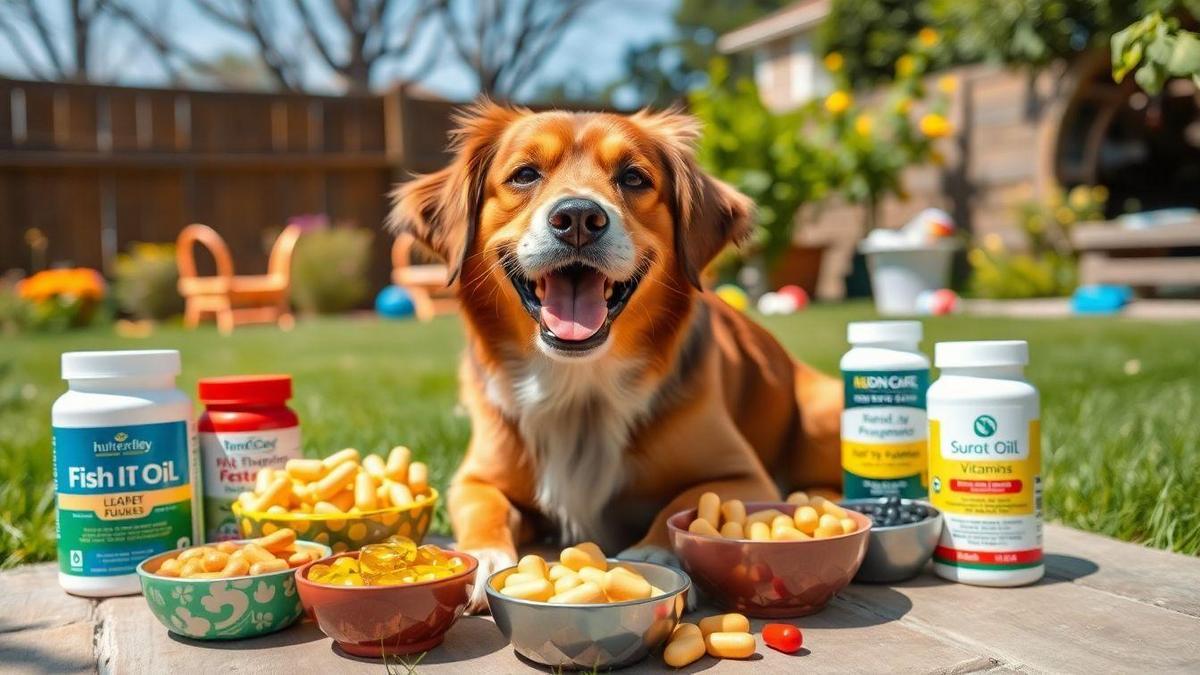
The Role of Supplements in Your Dog’s Nutrition
Why Consider Dog Nutrition Supplements?
When we think about our furry friends’ health, we often focus on their main meals. But have you ever thought about supplements? They can play an important role in our dogs’ diets. Just like us, dogs sometimes need a little extra help to stay healthy.
Many factors can influence our dogs’ nutritional needs. For example, age, breed, and activity level can all affect what they need. If our pup is a senior or has special health concerns, they might benefit from supplements. To learn more about managing health issues in senior dogs, see common health issues in senior dogs. By adding these to their diet, we can help them live their best lives.
How Supplements Can Fill Nutritional Gaps
Even the best dog food might not cover all of our dogs’ nutritional bases. This is where supplements come into play. They can fill in the gaps, making sure our dogs get everything they need.
Here are some common types of supplements and what they can do:
| Supplement Type | Benefits |
|---|---|
| Omega-3 Fatty Acids | Supports joint health and skin |
| Probiotics | Aids digestion and gut health |
| Vitamins | Boosts overall health |
| Minerals | Supports bone and teeth health |
For instance, if our dog isn’t getting enough omega-3s from their food, a supplement can help keep their coat shiny and their joints flexible.
Benefits of Pet Supplements
So, what are the real perks of adding supplements to our dogs’ diets? Here are some benefits we might notice:
- Improved Health: Supplements can help boost our dogs’ immune systems.
- Better Digestion: Probiotics can help our pups digest their food better.
- Joint Support: If our dog is older, supplements can help keep their joints healthy and pain-free.
- Shinier Coat: Omega-3s can lead to a healthier, shinier coat.
In short, supplements can be a great addition to our dogs’ diets. They can help us cover all the bases, making sure our furry friends get the best care possible.
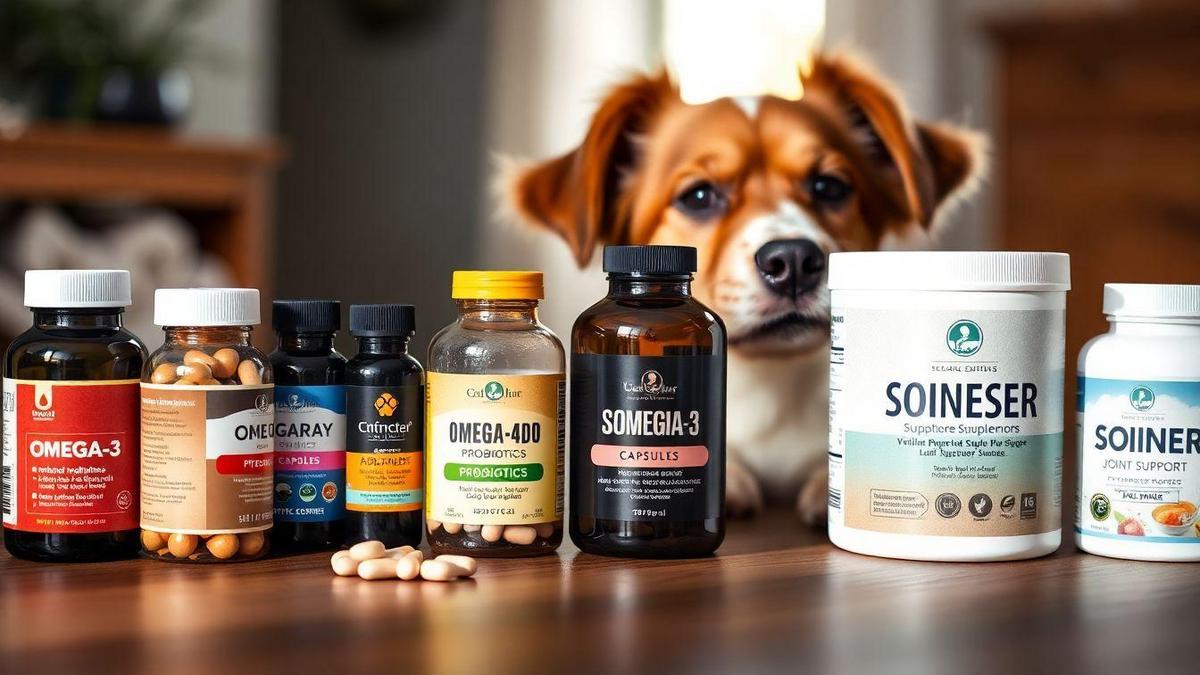
Types of Dog Dietary Supplements
Vitamins for Dogs: What Are They?
When we talk about vitamins for dogs, we’re diving into a world of essential nutrients that keep our furry friends healthy and happy. Just like us, dogs need vitamins to support their immune system, maintain healthy skin, and keep their energy levels up. These little powerhouses help our pets thrive!
Here’s a quick rundown of some important vitamins for our dogs:
| Vitamin | Benefits | Sources |
|---|---|---|
| Vitamin A | Supports vision and skin health | Liver, fish, carrots |
| Vitamin D | Helps with calcium absorption for strong bones | Fish, egg yolks |
| Vitamin E | Acts as an antioxidant, protecting cells | Nuts, seeds, spinach |
| B Vitamins | Important for energy and brain function | Meat, eggs, whole grains |
Natural Dog Supplements We Can Use
Now, let’s chat about natural dog supplements. These can be a great addition to our dog’s diet. They often come from plants or other natural sources and can help with various health issues. Some popular options include:
- Fish Oil: Great for shiny coats and healthy skin.
- Glucosamine: Supports joint health, especially for older dogs.
- Probiotics: Good for digestion and gut health.
These natural supplements can make a world of difference for our dogs. It’s like giving them a little extra boost in their daily routine!
Popular Canine Health Supplements
When we think about popular canine health supplements, a few stand out. Here are some that many dog owners swear by:
- Omega-3 Fatty Acids: These are fantastic for skin and coat health.
- Milk Thistle: Supports liver function.
- Turmeric: Known for its anti-inflammatory properties.
We can find these supplements in various forms, like chews, powders, or liquids. It’s all about finding what our dogs enjoy and what works best for them.
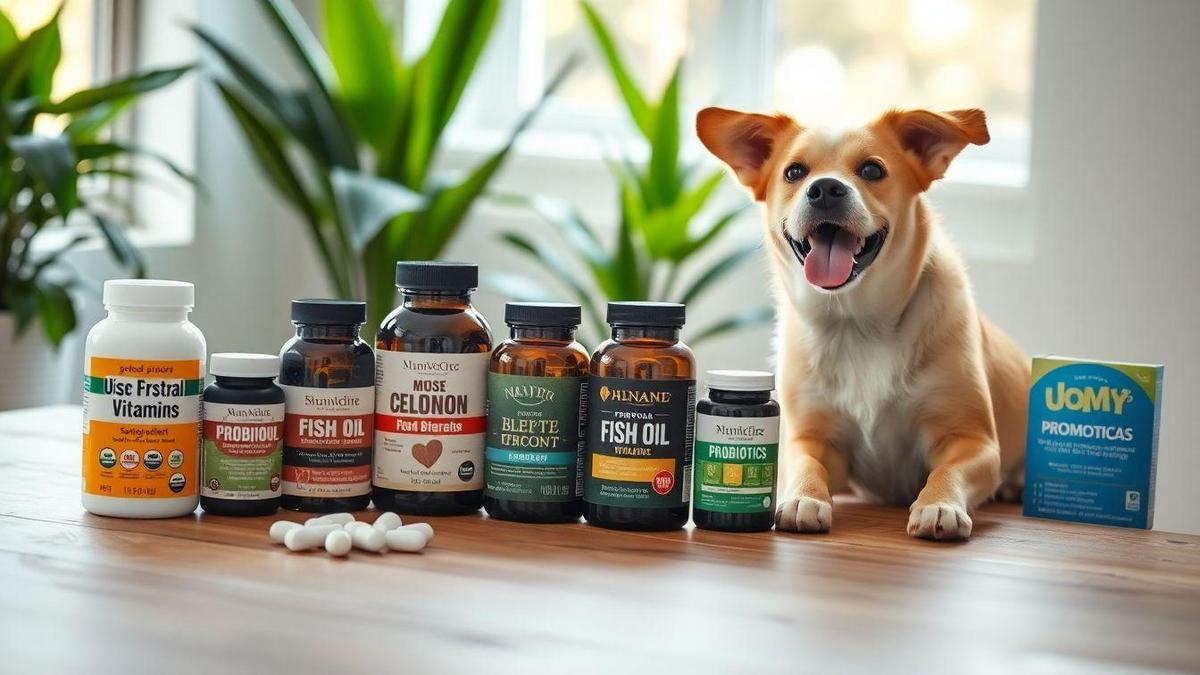
How to Choose the Best Supplements for Dogs
Factors to Consider When Selecting Supplements
When we’re on the hunt for the best supplements for our furry friends, there are a few key factors to keep in mind. First off, we need to think about our dog’s specific needs. Is our pup older and needing joint support? Or perhaps they have a sensitive stomach? Understanding what our dog requires is the first step in making a solid choice.
Next, we should consider the quality of the supplement. Not all products are created equal, so looking for brands that have a good reputation is essential. We can check if the product is made in a facility that follows good manufacturing practices. This gives us peace of mind knowing that what we’re giving our dog is safe and effective.
Lastly, we should think about our dog’s size and weight. Supplements often come with recommended dosages, and these can vary based on how big our dog is. Following these guidelines helps us avoid giving too little or too much.
Reading Labels: What to Look For
When we pick up a supplement, the label is our best friend. Here’s what we should look for:
- Active Ingredients: These are the ingredients that actually do the work. We want to see well-researched components that target our dog’s needs.
- Guaranteed Analysis: This section tells us the percentage of nutrients in the supplement. We should look for a good balance of vitamins, minerals, and other beneficial compounds.
- Expiration Date: Just like our food, supplements can go bad. We should always check the expiration date to ensure freshness.
- Manufacturer Information: A reputable company will be transparent about where they source their ingredients and how they make their products.
Here’s a simple table to help us remember what to check for on the label:
| Label Element | What to Look For |
|---|---|
| Active Ingredients | Well-researched, beneficial components |
| Guaranteed Analysis | Good balance of nutrients |
| Expiration Date | Ensure freshness |
| Manufacturer Information | Transparency about sourcing and production |
Dog Supplement Safety Tips
Safety is a top priority when we think about giving our dogs supplements. Here are some handy tips to keep in mind:
- Consult with a Vet: Before starting any new supplement, it’s always smart to have a chat with our veterinarian. They know our dog’s health history and can provide tailored advice.
- Start Slow: If we’re introducing a new supplement, starting with a small amount can help us see how our dog reacts. We can always increase the dose later if needed.
- Watch for Reactions: After giving a supplement, we should keep an eye on our dog for any unusual behavior or side effects. If something seems off, we should reach out to our vet right away.

The Benefits of Pet Supplements
When we think about our furry friends, their health is always at the forefront of our minds. That’s where pet supplements come into play! They can be a game-changer for our dogs, helping to fill in the gaps in their nutrition and keeping them feeling their best. Let’s dive into the benefits of these little wonders!
Boosting Immune Health with Supplements
Our dogs face many challenges daily, from environmental stressors to various illnesses. That’s why boosting their immune health is crucial. Supplements like omega-3 fatty acids and vitamin E can help strengthen their immune system.
Here’s a quick look at some popular immune-boosting supplements:
| Supplement | Benefits |
|---|---|
| Omega-3 Fatty Acids | Supports heart health and reduces inflammation |
| Vitamin E | Acts as an antioxidant, helping to fight off illness |
| Probiotics | Promotes gut health and overall well-being |
By adding these to our dog’s diet, we can help them fight off illness better and bounce back quicker when they do get sick.
Enhancing Joint Health for Active Dogs
For our active pups, joint health is a big deal! Whether they’re running, jumping, or playing fetch, we want to make sure their joints are up for the challenge. Supplements like glucosamine and chondroitin can help keep their joints healthy and pain-free. To learn more about keeping senior dogs active, see helping senior dogs stay active.
Here’s a look at some joint health supplements:
| Supplement | Benefits |
|---|---|
| Glucosamine | Helps rebuild cartilage and reduce pain |
| Chondroitin | Works with glucosamine to improve joint function |
| MSM | Reduces inflammation and pain in joints |
By giving our dogs these supplements, we can help them stay active and enjoy life to the fullest!
Long-Term Benefits of Regular Supplementation
When we think about the long-term benefits of regular supplementation, it’s like planting a seed for our dog’s future health. By consistently providing these nutrients, we can help prevent health issues down the line, keeping our dogs happy and healthy for years to come.
Regular supplementation can lead to:
- Stronger immune system: Less illness and quicker recovery.
- Improved joint health: More energy and agility.
- Better overall well-being: A happier, more active pup!

Holistic Dog Nutrition and Supplements
Integrating Supplements into a Natural Diet
When we think about our furry friends, we want the best for them, right? That’s where supplements come into play. They can be a great addition to a natural diet. Imagine feeding our dogs a mix of fresh veggies, lean meats, and grains. Now, let’s sprinkle in some supplements to boost their health!
For instance, if our dog is a bit sluggish, we might consider adding omega-3 fatty acids. These can help with joint health and give their coat a shiny look. Or, if our pup has a sensitive tummy, a good probiotic can work wonders. It’s like giving them a little extra help to feel their best!
The Importance of a Balanced Approach
Now, we don’t want to go overboard with supplements. Too much of a good thing can be harmful. It’s all about balance. We need to remember that supplements are just that—supplements. They should enhance our dog’s diet, not replace it.
Here’s a quick table to help us keep track:
| Supplement | Benefit | Recommended Use |
|---|---|---|
| Omega-3 Fatty Acids | Supports joint and coat health | Daily, as directed |
| Probiotics | Aids digestion | Daily, especially after illness |
| Multivitamins | Fills nutritional gaps | As needed, based on diet |
By keeping this balance, we can help our dogs thrive!
Holistic Dog Nutrition Strategies
So, how do we create a holistic nutrition plan for our dogs? It’s easier than it sounds! Here are some strategies we can use:
- Choose Whole Foods: Fresh meats, vegetables, and grains should be our go-to. Think of it as cooking a healthy meal for ourselves!
- Consult a Vet: Before adding any supplements, let’s chat with our vet. They can guide us on what our dog truly needs.
- Monitor and Adjust: Just like us, our dogs can change over time. We should keep an eye on their health and adjust their diet and supplements as needed.
By following these strategies, we can support our dogs’ health and happiness.
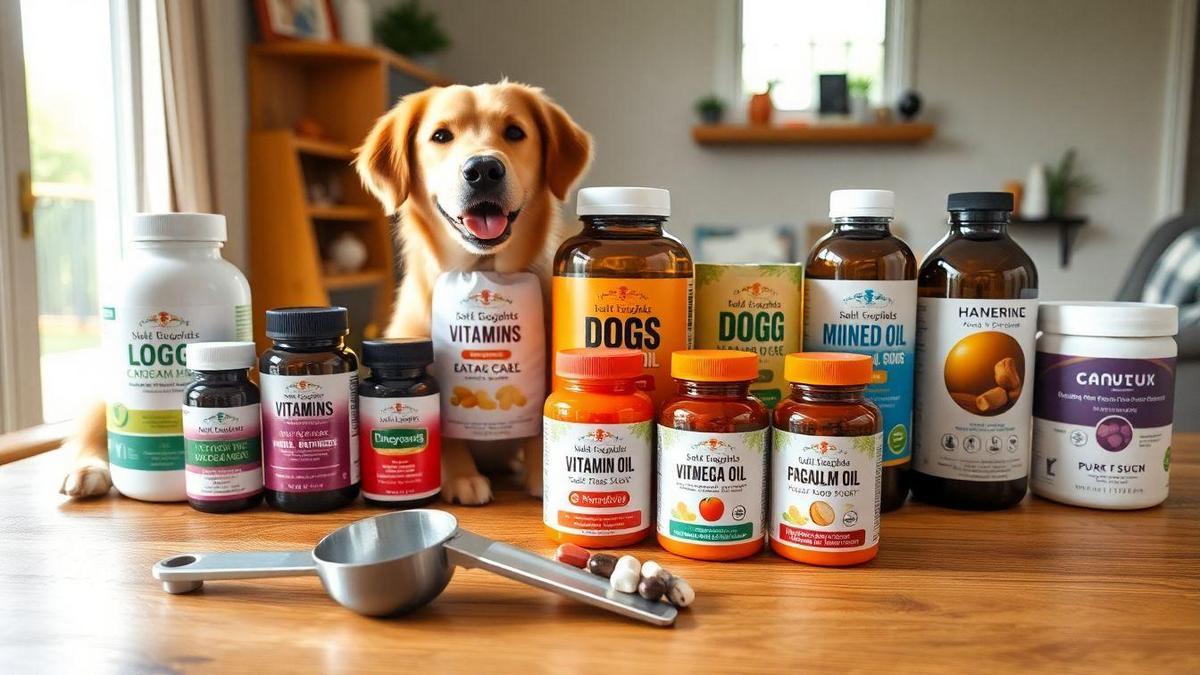
Ideal Portions and Dosage for Dog Supplements
How Much Should We Give Our Dogs?
When it comes to giving our dogs supplements, figuring out the right amount can feel a bit tricky. We want to make sure our furry friends get the benefits without overdoing it. The dosage often depends on their size, age, and specific health needs.
Here’s a simple guide to help us out:
| Dog Size | Daily Dosage (General) |
|---|---|
| Small (up to 20 lbs) | 1/4 to 1/2 of the recommended dose |
| Medium (21-50 lbs) | 1/2 to 1 full dose |
| Large (51-90 lbs) | 1 to 1.5 doses |
| Extra Large (90 lbs) | 1.5 to 2 doses |
Always check the label on the supplement for specific instructions. It’s like following a recipe; a little too much or too little can change the final dish!
Guidelines for Safe Supplement Use
To keep our dogs safe, we should always follow a few basic rules when using supplements:
- Consult the Vet: Before starting any new supplement, it’s a good idea to chat with our veterinarian. They know our dog’s health history and can give us tailored advice.
- Start Slow: When introducing a supplement, we can start with a smaller dose and gradually increase it. This way, we can see how our dog reacts.
- Watch for Reactions: Keep an eye out for any changes in behavior or health. If our pup seems off, it’s best to stop the supplement and consult the vet.
Monitoring Our Dog’s Response to Supplements
As we give our dogs supplements, monitoring their response is key. Just like we notice how our bodies feel after taking vitamins, our dogs can have different reactions too. Here are some signs to look for:
- Improved Energy: If our dog seems more playful and active, that’s a good sign!
- Changes in Coat: A shiny coat can indicate that the supplement is working well.
- Digestive Issues: If our dog experiences an upset stomach or diarrhea, we may need to adjust the dosage or stop the supplement.
By paying attention to these signs, we can make sure our pups are getting the most out of their supplements without any hiccups.
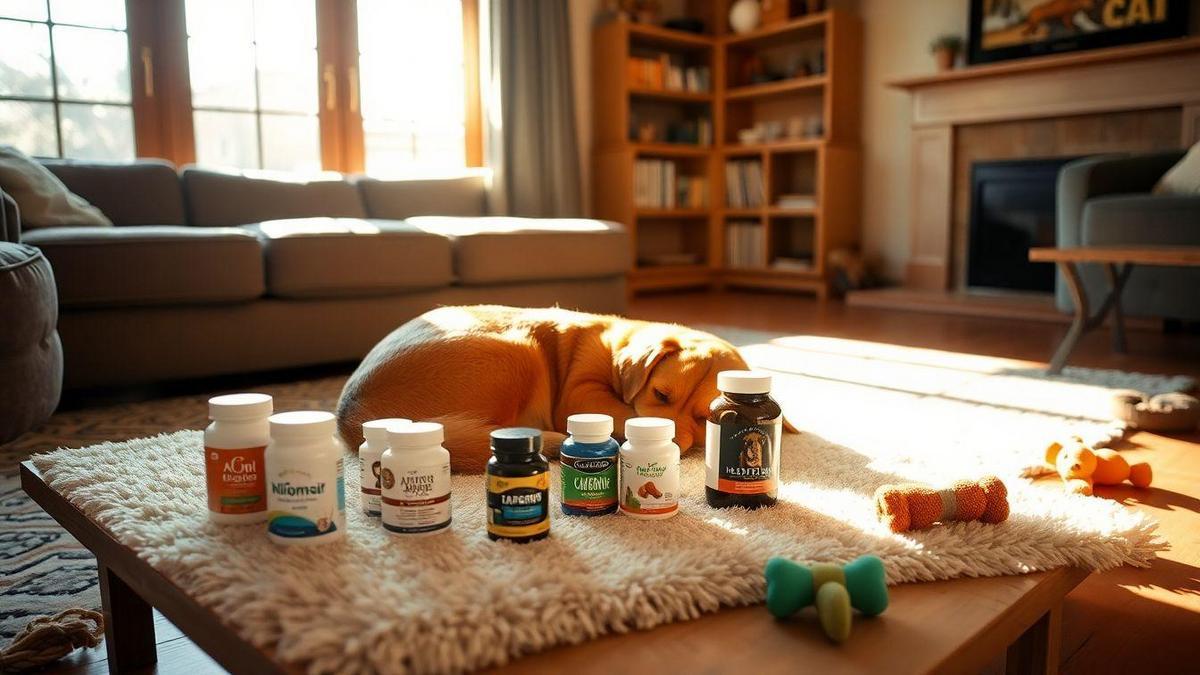
Common Myths About Dog Supplements
Debunking Misconceptions About Pet Supplements
When we think about dog supplements, it’s easy to get lost in a sea of information. Many of us have heard a lot of myths floating around. Some folks say that supplements are just a money grab. Others believe that if they feed their dog a good diet, they don’t need any extras. But, let’s set the record straight: supplements can play an important role in our furry friends’ health.
Facts vs. Fiction: What We Should Know
Let’s break it down. Here are some common myths versus the facts:
| Myth | Fact |
|---|---|
| Supplements are unnecessary. | Many dogs may benefit from supplements, especially if they have specific health needs. |
| All supplements are the same. | Different supplements serve different purposes. It’s crucial to choose the right one for your dog. |
| Natural diets cover all bases. | While natural diets are great, they might still lack certain nutrients that supplements can provide. |
Educating Ourselves on Supplement Use
As we dive deeper into The Role of Supplements in Your Dog’s Nutrition, we must educate ourselves. It’s all about knowing what our pups need. For instance, if we have an older dog, they might need joint support. A puppy might benefit from extra vitamins for growth.
Let’s not forget that we should always talk to our vet before adding any supplements. They can help us navigate this journey and find what’s best for our dogs.

The Future of Dog Nutrition and Supplements
Trends in Canine Health Supplements
As we look ahead, the dog nutrition landscape is changing fast. More and more pet parents are turning to health supplements to boost their furry friends’ well-being. We’re seeing a rise in natural ingredients like probiotics, omega fatty acids, and antioxidants. These supplements can help with everything from digestion to shiny coats.
Did you know that over 40% of dog owners are now using supplements? That’s a big jump! We’re all looking for ways to keep our pups healthy and happy.
Here are some popular trends we’ve noticed:
- Probiotics for gut health
- Joint support supplements with glucosamine
- Vitamins tailored for specific needs
- Herbal remedies that support overall wellness
Innovations in Dog Nutrition Products
It’s exciting to see new products hitting the shelves. Companies are getting creative with dog food and supplements. We’re now seeing options like meal kits and fresh food delivery, which make it easier to provide our dogs with high-quality meals. For guidance on homemade dog food, check out homemade dog food recipes.
Here’s a quick look at some innovations:
| Product Type | Description |
|---|---|
| Meal Kits | Pre-portioned ingredients for fresh meals at home |
| Freeze-Dried Meals | Nutrient-rich meals that are easy to store and serve |
| Customized Nutrition Plans | Tailored diets based on breed, age, and health needs |
These innovations not only offer convenience but also help us give our pups the best nutrition possible.
What’s Next for Our Dogs’ Health?
Looking into the future, we can expect even more advancements in dog nutrition. As we continue to learn about our dogs’ needs, new supplements and foods will emerge. We might see more personalized nutrition based on our pets’ DNA.
With all these changes, one thing is clear: The Role of Supplements in Your Dog’s Nutrition will keep growing. We’re all in this together, trying to give our dogs the best lives possible.
Conclusion
In wrapping up our discussion on The Role of Supplements in Your Dog’s Nutrition, it’s clear that these little additions can make a big difference in our furry friends’ lives. Just like us, our dogs need a well-rounded diet, and sometimes a little extra help to stay at their best. We’ve learned that supplements can bridge those gaps in nutrition, supporting everything from joint health to a glossy coat.
As we navigate this journey, let’s remember to consult with our veterinarian and choose supplements tailored to our dogs’ specific needs. It’s all about finding that sweet spot where our pups thrive, feeling their best every day. So, let’s keep the conversation going and continue exploring ways to enhance our dogs’ health and happiness.
For more insights and tips on caring for our beloved pets, don’t hesitate to check out more articles at redeversatil.com. Happy reading!
Frequently asked questions
How do supplements help our dogs?
Supplements can fill gaps in our dog’s diet. They support overall health, joint function, and even shiny coats.
What types of supplements should we consider?
We should think about vitamins, minerals, and omega fatty acids. Probiotics and joint supplements can also be great choices.
When should we start giving our dog supplements?
We can start giving our dog supplements at any age. Puppies, adults, and seniors may all benefit at different times.
Why are supplements important in The Role of Supplements in Your Dog’s Nutrition?
Supplements help ensure our pups get everything they need. They boost energy, support immune health, and keep our dogs happy!
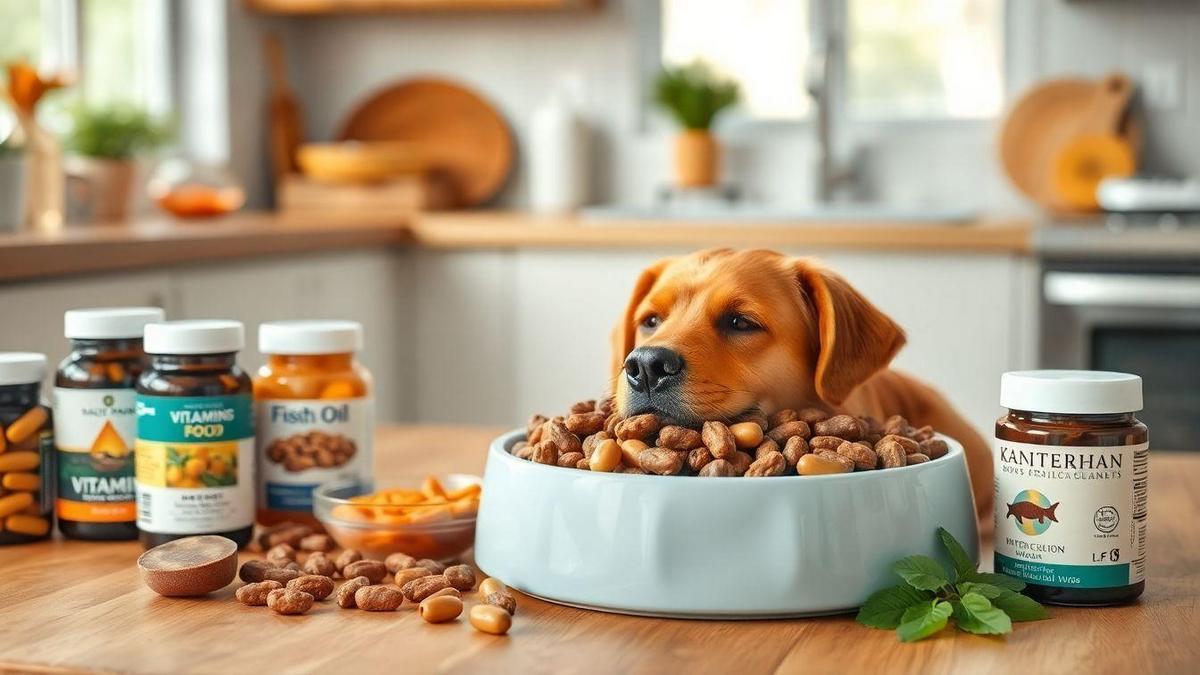
2 comentários em “The Role of Supplements in Dog Nutrition”